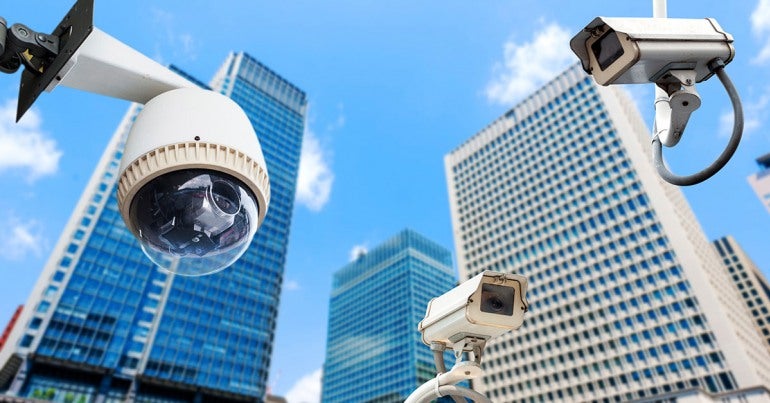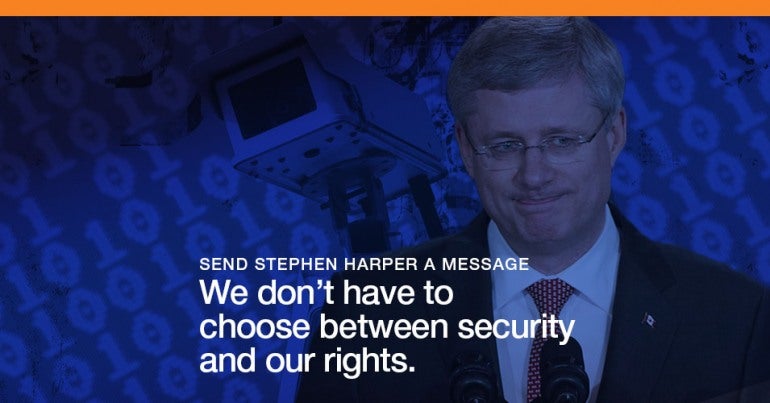On January 30, 2015, the government of Canada tabled Bill C-51, the Anti-Terrorism Act, 2015. The government is currently attempting to rush this Bill through Parliament without fulsome debate on this controversial piece of legislation.
All Canadians have reason for concern over the changes to the Criminal Code, law enforcement, rights of due process, rights of free speech, privacy protections and the expansion of the government’s intelligence gathering powers which are all encompassed in this legislation.
Here’s why
Limits on Free Speech/Freedom of Expression
- Bill C-51 adds a new offence to the Criminal Code that will limit Canadians’ freedom of speech. New section 83.221 is as follows, “Every person who, by communicating statements, knowingly advocates or promotes the commission of terrorism offences in general [whether you meant it or not] is guilty of an indictable offence and is liable to imprisonment for a term of not more than five years.”
- Right now there are 14 anti-terror provisions of the Criminal Code. You can only be charged with a criminal offence if someone thinks you have already committed an act of terrorism. The Code clearly defines what an act of terror is.
- Under C-51, things will be much different. Now you can be criminally charged for “advocating or promoting the commission of terrorism offences in general”. Unlike act of terror, the term “terrorism offences in general” is not defined.
- The very real fear is that one person’s opinion about whether people should blockade a road as part of a peaceful protest in a free and democratic society, or whether a letter to editor supporting one side or the other in the Ukraine or in the Middle East is another person’s promotion of “terrorism offences in general”.
-
Legal experts have said it is “a deliberately opaque and unknowable term”. They argue this new offence will limit free speech in Canada and breaches the right to freedom of expression under the Canadian Charter of Rights and Freedoms.
A Canadian Secret Police?
- Parliament created the Canadian Security Intelligence Service (CSIS) in 1984. It deliberately separated intelligence gathering activity (CSIS) from law enforcement (RCMP) to protect privacy and limit the abuse of power.
- Bill C-51 fundamentally changes the mandate of CSIS. Instead of only collecting information, CSIS gets the new power to take “measures” to “reduce a threat to the security of Canada.” In other words, CSIS no longer will simply collect information, it can now use the information gathered to act against Canadians.
- And, if CSIS thinks you pose a threat to national security, Bill C-51 gives CSIS powers so broad that it can now ask a judge for a warrant that authorizes them to violate your Charter rights like freedom of expression and association, protection of your safety, security, privacy and protection against arbitrary detention. They don’t have to prove they think you did something wrong, just that they think you might do something they say is a threat.
-
In recent years, the lack of effective oversight over CSIS has been a serious issue. Many have called for improved public accountability and civilian oversight. Under Bill C-51, CSIS powers have been expanded without creating any improvement in its oversight or the checks and balances on its powers.
Who and What Poses a Security Threat to Canada?
- Bill C-51 gives CSIS the power to disrupt threats that undermine the security of Canada by “unlawful means” including interference with the economic or financial stability of Canada or its infrastructure. These definitions are so broad that they could very well include protests that the government deems to threaten economic stability including activities such as road blockades, environmental protests, Aboriginal demonstrations and work stoppages.
- Unlawful does not mean criminal. Peaceful protest events that do not have the proper permits are technically unlawful and could be swept into this clause as are strikes that do not conform to labour law.
-
Many have criticized these expanded powers as constituting a political tool for the government to demonize its critics and have little or nothing to do with fighting terrorism.
Violation of Charter Rights without Due Process
- Bill C-51 expands the powers of law enforcement agencies to detain people as a preventative measure.
- After September 11, 2001 (9/11), the Criminal Code was amended to give police the power to detain someone when they have reasonable grounds to believe that terrorist activity “will” take place, and detention is “necessary” to stop the act of terrorism. The detention without any charge (which is normally not allowed) could last up to three days.
- With Bill C-51, police will be able to detain for up to seven days on the suspicion that terrorist activity “may” be carried out and that detention is just “likely” to prevent the carrying out of the terrorist activity.
-
Legal experts have argued the original post 9/11 changes infringed on constitutionally protected rights of due process. Under Bill C-51, the standard for legitimate detention has been so significantly lowered that it is likely the Bill is unconstitutional.
Violation of the Right to Privacy
- Bill C-51 allows for the sharing of personal information between government departments. This means that health, income tax and other information can be shared with law enforcement agencies.
- Under Bill C-51 information can be justifiably shared under the new concept of “activities that undermine the security of Canada”.
-
On January 30th, the Privacy Commissioner of Canada voiced concerns about the broad powers that would be conferred by Bill C-51 and in particular, allowing government agencies to share personal information of ordinary Canadians for the purpose of detecting new threats to Canada’s security.
Bill C-51 is being pushed through Parliament by the government without the time needed for our elected representatives to give it appropriate review and scrutiny. The Liberal Party committed to support the Bill before they even saw its contents. The NDP stands in opposition to Bill C-51 and has managed to increase the number of days devoted to hearing expert witnesses comment on the Bill. Still, it is not being given the time needed to ensure all Canadians are aware of its content and the impact it will have on our lives.
Prime Minister Stephen Harper has said that if you are a law abiding Canadian, Bill C-51 poses no threat to you. That is not true. It certainly poses a threat to those who choose to make known their disagreement with the government or choose to take collective action to protect their rights.
More importantly, Bill C-51 poses an enormous threat to Canadian democracy by limiting free speech, denying due process and violating personal privacy. This poses a threat to every single Canadian.



